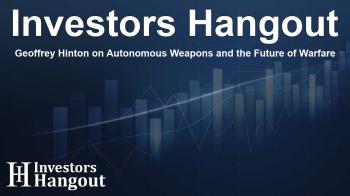Geoffrey Hinton on Autonomous Weapons and the Future of Warfare

Geoffrey Hinton's Insight on AI and Warfare
Geoffrey Hinton, known as the "godfather of AI" and a Nobel laureate, has recently shared his perspective on how autonomous weapons could exacerbate warfare. He emphasizes that the very essence of human casualties prevents conflicts, and without these, the likelihood of warfare increases significantly.
Strategic Benefits for Wealthy Nations
In an enlightening discussion, Hinton pointed out that wealthy nations may gain a considerable edge over poorer nations through the use of lethal autonomous weapons. These weapons shift the narrative of war from human losses to mechanical failures, potentially allowing for more aggressive military actions.
He stated, "The thing that stops rich countries from invading poor countries is their citizens coming back in body bags. With autonomous weapons, instead of corpses, they will have destroyed robots. This could make wars more frequent and less restricted by ethical concerns."
Military-Industrial Complex and Financial Gains
As the landscape of warfare evolves, Hinton suggests that the military-industrial complex stands to profit immensely from the deployment of expensive autonomous systems. Major defense contractors are already developing advanced technologies with enormous price tags associated with their deployment and maintenance. As these systems costt more, they ensure continuous funding and support for the complex's growth.
Companies like Lockheed Martin Corp. (NYSE: LMT) are at the forefront of developing these technologies, evidenced by their investments in programs like the F-35, which has an estimated total cost of $1.8 trillion.
Impacts of AI in Current Conflicts
Hinton noted that AI technology is not just on the horizon; it is already shaping battlefields around the world. The ongoing conflict in regions like Ukraine illustrates how low-cost drone technology is providing significant advantages over traditional military hardware.
He remarked, "A $500 drone can now effectively neutralize a multimillion-dollar tank." This stark comparison highlights the shifting paradigm of warfare where less costly, autonomous technology challenges conventional military strategies.
Regulatory Issues and Ethical Concerns
Despite the advancements and potential benefits, Hinton expressed his worry regarding the lack of regulation surrounding autonomous weapons. Countries that produce arms, such as the US, Russia, China, and others, seem hesitant to impose restrictions that could limit their economic interests.
After his departure from Alphabet Inc. (NASDAQ: GOOGL), Hinton becomes more vocal about AI risks and recently voiced support for Tesla Inc. (NASDAQ: TSLA) CEO Elon Musk's efforts to challenge OpenAI’s shift towards a profit-driven model.
Moreover, tech companies like Palantir Technologies Inc. (NYSE: PLTR) are leveraging AI to enhance military operations, including innovative data analytics and drone technologies applied in Ukraine's demining efforts.
Conclusion: The Future of Warfare Under Scrutiny
The discussions around autonomous weapons and their implications on warfare are both timely and critical. With technological developments racing ahead, the risks associated with unregulated advancements compound the ethical dilemmas we face today.
Frequently Asked Questions
What is Geoffrey Hinton's perspective on autonomous weapons?
Geoffrey Hinton warns that autonomous weapons could lead to increased warfare by eliminating human casualties, thus removing a deterrent against conflict.
How do autonomous weapons favor wealthy nations?
Hinton explains that wealthy nations can utilize these weapons for military actions without the backlash of human fatalities, making them more prone to engage in conflicts.
What are the financial implications of autonomous weapons?
The military-industrial complex benefits significantly from these systems, as they tend to be costly to produce and maintain, ensuring continuous profits for defense contractors.
How is AI affecting current conflicts?
AI is revolutionizing battlefields; for instance, cost-effective drones are outmatching expensive traditional military equipment, as seen in various conflicts including Ukraine.
Are there regulations on autonomous weapons?
Hinton expresses concern that major arms-producing nations are reluctant to impose regulations, prioritizing economic interests over ethical considerations.
About The Author
Contact Kelly Martin privately here. Or send an email with ATTN: Kelly Martin as the subject to contact@investorshangout.com.
About Investors Hangout
Investors Hangout is a leading online stock forum for financial discussion and learning, offering a wide range of free tools and resources. It draws in traders of all levels, who exchange market knowledge, investigate trading tactics, and keep an eye on industry developments in real time. Featuring financial articles, stock message boards, quotes, charts, company profiles, and live news updates. Through cooperative learning and a wealth of informational resources, it helps users from novices creating their first portfolios to experts honing their techniques. Join Investors Hangout today: https://investorshangout.com/
The content of this article is based on factual, publicly available information and does not represent legal, financial, or investment advice. Investors Hangout does not offer financial advice, and the author is not a licensed financial advisor. Consult a qualified advisor before making any financial or investment decisions based on this article. This article should not be considered advice to purchase, sell, or hold any securities or other investments. If any of the material provided here is inaccurate, please contact us for corrections.

